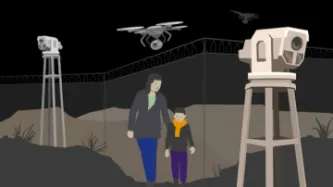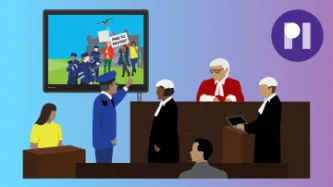Search
Content type: Long Read
In 2019, the Waorani achieved a huge legal victory against the Ecuadorian government. They opposed the sale of millions of hectares of their rainforest to new oil companies, a forest that forms part of the home and territory of seven different Indigenous peoples in the southern Ecuadorian Amazon. Nemonte Nenquimo, as the first female leader of the Waorani of Pastaza and co-founder of the nonprofit Alianza Ceibo, and plaintiff in this case, has been a powerful advocate for her community’s…
Content type: Examples
On behalf of the Norwegian government, the Norwegian Intelligence Service has awarded Kongsberg Defence and Aerospace (“Kongsberg”) a four-year contract to supply satellite maritime surveillance data in order to cover Norwegian Areas of Interest. Kongsberg will produce three satellites and equip them with automatic identification system receivers and detector systems; the data will be used by the Norwegian Armed Forces and other Norwegian government bodies. Kongsberg will be the owner of the…
Content type: Examples
Westminster Group PLC has ratified a ten-year, multi-million-pound contract to supply ground security operations and advanced detection, surveillance, and screening equipment, as well as maintenance, training, and support at one domestic and four international airports in the Democratic Republic of the Congo (DRC). Under the managed services model, which Westminster has deployed elsewhere in Africa, revenues will be driven by embarking passenger numbers and funded by a fee per passenger…
Content type: Examples
As part of an agreement worth up to $20.8 million, Teledyne FLIR Defense will deliver ultra long-range multi-spectral imaging surveillance systems, or Star SAFIRE 380-HLD, to the Japan Maritime Defense Force, which will integrate them into the licenced Japan-based production version of the Sikorsky SH-60 helicopter. The system can operate continuously in all weather conditions and can transmit both thermal and visual imagery in high definition to those who are operating it. https://www.…
Content type: Examples
The Swedish Defence Materiel Administration has awarded Saab a $245 million contract to provide the Swedish air force with a third GlobalEye surveillance aircraft and other services like those already in use in UAE. The contract runs until 2029. The air force is accelerating the schedule for introducing locally-designated assets after donating its current two Erieye radar-equipped Saab 340 early warning and control aircraft to Ukraine. https://www.flightglobal.com/defence/sweden-signs-…
Content type: Examples
The US Air Force will give Capella Space Corp $15 million in funding to improve and scale its synthetic aperture radar to deliver enhanced resolution imagery. Capella also supplies technology to the National Geospatial Intelligence Agency, National Reconnaissance Office, US Navy, US Space Force, and NASA.https://www.capellaspace.com/press-releases/capella-space-awarded-a-15m-contract-with-the-u-s-air-forcePublication: Capella SpaceWriter: Capella Space
Content type: Examples
It has been announced that the California Highway Patrol has signed a $1.6 million (for the first year) contract with Flock Safety to install 480 high-tech cameras on Oakland's streets and freeways to identify licence plates and catalogue passing vehicles by make, model, colour, and other features. An official asserted that footage obtained from the cameras would be deleted after 28 days and not shared with third parties or other states that might use the information to track people seeking or…
Content type: Examples
The UK Home Office has renewed its 3 year long contract with Tekever to provide maritime surveillance as a service across the English Channel using its AR5 and AR3 model drones, also known as Unmanned Aerial Vehicles (UAVs). The AR5 system is a UAV that is intended to conduct surveillance missions and can fly for more than 20 hours and carry sensors such as maritime radar and day and night cameras. It will be used to detect, recognise, track, and identify potentially illegal vessels and…
Content type: Examples
Under a new contract, Planet Labs PBC will provide the NATO Communications and Information Agency's Alliance Persistent Surveillance from Space programme (APSS) with satellite data to aid in detailed tracking and analysis of foreign military activities and fill intelligence gaps. APSS is a multi-year, multinational project to use space to collect data on any location at any time and enhance NATO's engagement with future technologies, for example Artificial Intelligence (AI) and cloud…
Content type: Examples
The US Department of Defense has awarded a contract worth almost $250 million to Anduril Industries for more than 500 Roadrunner-Ms as well as Pulsar electronic warfare capabilities, with AI-enabled systems, to counter the threat of attacks using unmanned aerial systems in “priority regions”. Anduril has won nearly $350 million in contracts since these technologies were publicly launched.https://www.designdevelopmenttoday.com/industries/military/news/22922589/anduril-awarded-250-million-air-…
Content type: Examples
Under a new contract effective from October 2024 to December 2025, PureTech Systems, which specialises in geospatial AI-boosted video analytics, will deploy its command-and-control software in 22,600 square kilometers of the US border. The software will integrate the sensors attached to existing surveillance towers while retaining the interface already familiar to border agents.https://www.prnewswire.com/news-releases/puretech-systems-inc-awarded-major-command-and-control-contract-by-us-…
Content type: Long Read
18th December is International Migrants Day, a day to recognize both the contributions and continued struggles of migrants across the world.Migrants continue to face an increased level of human rights violations through hostile immigration policies and practices. At borders and beyond, their fundamental human rights and dignity are being violated through old and new technologies. These systems in place reinforce the dehumanising rhetoric of migrants, who are merely seeking asylum and a better…
Content type: Examples
Amazon is calling for the dismissal of a complaint issued by the National Labor Relations Board after two warehouse workers in the US state of Georgia claimed they faced retaliation, surveillance, and questioning after they led employee complaints about policy changes. Amazon, in common with other companies such as Trader Joe's and Starbucks, is claiming that following a recent US Supreme Court decision ending the "Chevron deference" principle, the NLRB's complaint violates the US constitution…
Content type: Report
In this new briefing, we identify the most significant concerns on the UN Countering Terrorist Travel Programme (CTTP), and put forward a range of recommendations to mitigate some of the human rights risks associated with the surveillance of travellers. We based our briefing on publicly available information and our own research, outlining the purposes and activities of this UN programme. We shared a draft of this briefing with the United Nations Office of Counter- Terrorism (OCT), which…
Content type: Long Read
In this new briefing, we identify the most significant concerns on the UN Countering Terrorist Travel Programme (CTTP), and put forward a range of recommendations to mitigate some of the human rights risks associated with the surveillance of travellers. We based our briefing on publicly available information and our own research, outlining the purposes and activities of this UN programme. We shared a draft of this briefing with the United Nations Office of Counter- Terrorism (OCT), which…
Content type: Advocacy
On the 13 November 2024 a debate took place in the UK parliament on the police’s use of facial recognition technology (FRT) for the first time, despite facial recognition being used as far back as 2017.The issue was debated by 13 members of parliament (MPs) representative of a range of political parties, as well as the Minister for Fire, Policing and Crime Prevention. Throughout the debate several MPs raised concerns around privacy, surveillance, issues of facial recognition disproportionately…
Content type: Advocacy
In the wake of Privacy International’s (PI) campaign against the unfettered use of Facial Recognition Technology in the UK, MPs gave inadequate responses to concerns raised by members of the public about the roll-out of this pernicious mass-surveillance technology in public spaces. Their responses also sidestep calls on them to take action.The UK is sleepwalking towards the end of privacy in public. The spread of insidious Facial Recognition Technology (FRT) in public spaces across the country…
Content type: Long Read
IntroductionIn early October this year, Google announced its AI Overviews would now have ads. AI companies have been exploring ways to monetise their AI tools to compensate for their eye watering costs, and advertising seems to be a part of many of these plans. Microsoft have even rolled out an entire Advertising API for its AI chat tools.As AI becomes a focal point of consumer tech, the next host of the AdTech expansion regime could well be the most popular of these AI tools: AI chatbots.…
Content type: Advocacy
The rapid expansion of educational technologies (EdTech) has introduced serious concerns about human rights protection in educational spaces. This briefing explores the impact of facial recognition technology (FRT) and heightened surveillance in these settings, highlighting many complex and multifaceted issues that demand careful consideration from a human rights perspective. From the erosion of privacy and the securitisation of educational spaces - that undermines the learning and growth…
Content type: Report
With this report, we shed light on the due process implications of the blanket and indiscriminate surveillance of protesters, activists, and human rights defenders participating in protests. We demonstrate that information gathered through the surveillance of protests is being used in criminal proceedings against activists, protesters, and human rights defenders. We also also show that when this information is being admitted as evidence in criminal proceedings it undermines the right to fair…
Content type: Advocacy
In August 2024 the UK College of Policing (CoP) announced they were consulting on new guidance for data ethics and data driven technologies in policing. As part of the consultation the College asked for feedback on two new authorised professional practices (APP) on data ethics and data-driven technologies. PI provided a response in writing to the CoP on their APP on data ethics and data-driven technologies only.In our response we highlighted that we are aware that UK police forces are using a…
Content type: Long Read
Increasingly, EdTech systems are less about teaching than about monitoring, security and ‘safety’ – although those aims are often mixed with wider educational claims.For instance, one company offering “high quality surveillance systems and CCTV for schools including sophisticated infra-red cameras which record in the darkest areas” claimed that these both deter “bad or antisocial behaviour from pupils, parents and visitors” and improve the concentration, productivity and attainment of the…
Content type: News & Analysis
Também disponível em portuguêsThe UN Special Rapporteur on the right to education published her report on academic freedom, which recommends that states ban facial recognition technologies from educational institutions.Brazil’s educational system - which is built on the fundamental value: the best interest of the child, is one of the world’s worst offenders. So far 1,667 schools in the state of Paraná alone have adopted a technology that the UN’s leading expert believes threatens student’s…
Content type: Long Read
IntroductionHarnessing new digital technology to improve people’s health is now commonplace across the world. Countries and international organisations alike are devising digital health strategies and looking to emerging technology to help solve tricky problems within healthcare. At the same time, more and more start-ups and established tech companies are bringing out new, and at times innovative, digital tools aimed at health and wellbeing.
Content type: Long Read
IntroductionWith the ongoing expansion of GPS tagging under the UK Home Office's electronic monitoring programme, it has increasingly deployed non-fitted devices (NFDs) that track a person's GPS location and request frequent biometric verification in the form of fingerprint scans.The NFDs deployed by the UK Home Office are small handheld devices with a fingerprint scanner that record a person's location 24/7 (referred to as their trail data). They alert the person at random intervals throughout…
Content type: Long Read
Education is a fundamental human right outlined in the Universal Declaration of Human Rights (Article 26), which states that everyone has the right to education. Schools play a core role in the education of children, but it’s also in schools that children are encouraged to learn to work with others, and to develop their own identities and emotional skills. The education process doesn’t stop there, it continues as children grow and make their way through different higher educational spaces such…
Content type: Long Read
1. What is the issue?Governments and international organisations are developing and accessing databases to pursue a range of vague and ever-expanding aims, from countering terrorism and investigating crimes to border management and migration control.These databases hold personal, including biometric, data of millions if not billions of people, and such data is processed by technologies, including Artificial Intelligence (AI), to surveil, profile, predict future behaviour, and ultimately make…
Content type: Long Read
Elections and political campaigns are increasingly mediated by digital technologies. These technologies rely on collecting, storing, and analysing personal information to operate. They have enabled the proliferation of tailor-made political advertising. The recent proliferation of AI technologies is enabling ever more sophisticated content creation and manipulation in the context of elections.In parallel, governments are continuing to invest in digital technologies for the running of elections…
Content type: News & Analysis
Artificial intelligence decision making systems have in recent years become a fixture of immigration enforcement and border control. This is despite the clear and proven harmful impacts they often have on individuals going through the immigration system. More widely, the harms of automated decision making have been increasingly there for all to see: from systems that encode bias and discrimination, as happened in the case of an algorithm used to detect benefit fraud in the Netherlands, to…
















